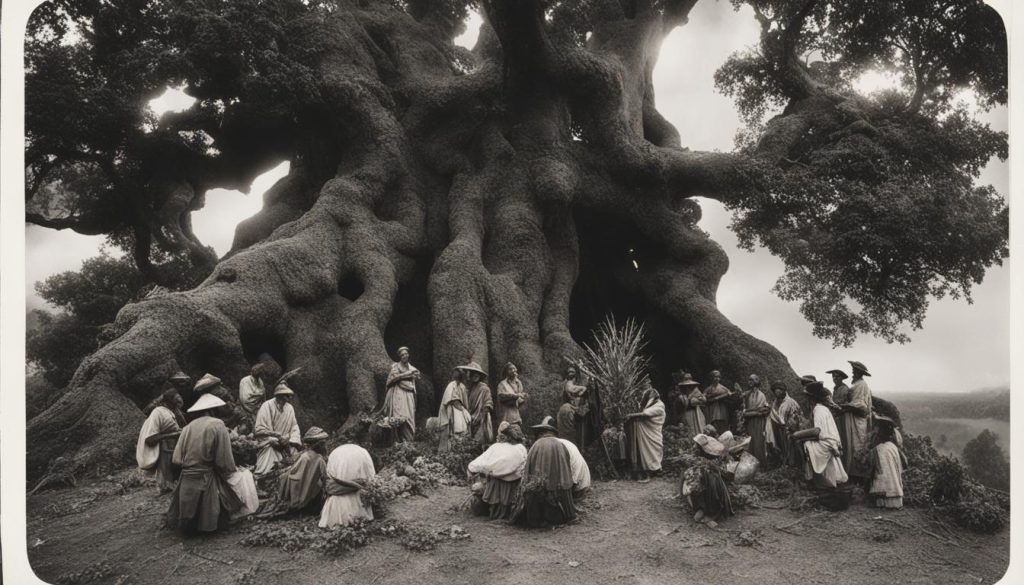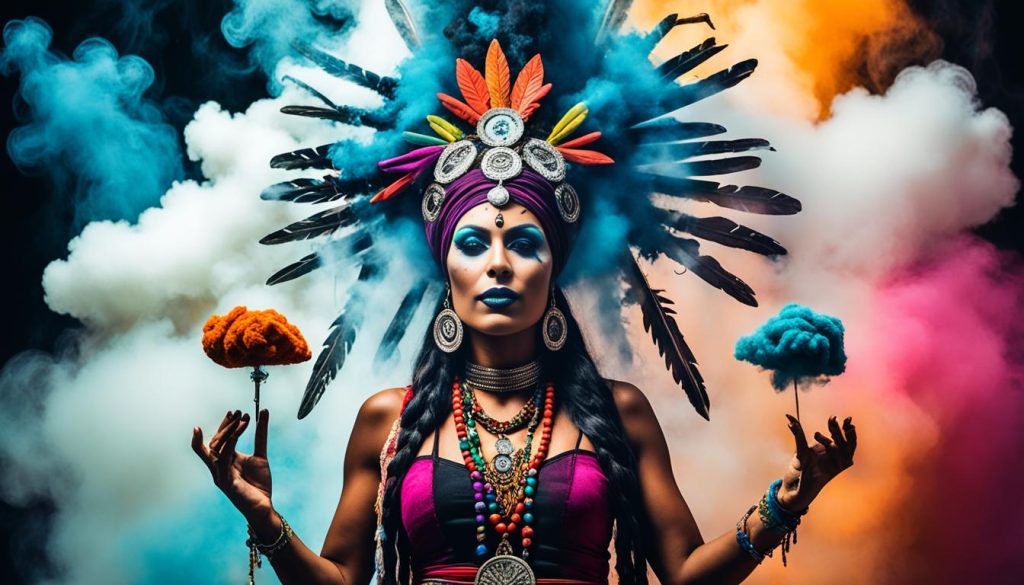Discover the fascinating origins of voodoo, a religion that has captivated hearts and minds for centuries. Dive into the rich history and learn how this intricate belief system formed, evolved, and spread across the continents.
Contrary to popular misconceptions, voodoo didn’t arise from the realm of fiction; it has deep roots in West Africa, specifically in modern-day Benin. The origins of voodoo can be traced back to ancient traditions of ancestor worship and animism, where spirituality intertwined with the natural world.
Through the transatlantic slave trade, the practice of voodoo found its way to the Americas, where it merged with elements of Roman Catholicism and Haitian Vodou. This amalgamation created a unique form of voodoo that differs from its African origins.
Unravel the mysteries surrounding voodoo as we uncover its birthplace, delve into its beliefs and practices, and explore the significant influence of the African slave trade. Gain a deeper understanding of this misunderstood religion and discover the cultural and spiritual significance it holds even today.
Beliefs and Practices of Voodoo
Voodoo is a fascinating and intricate belief system that encompasses a wide range of cultural elements. At its core, Voodoo teaches a belief in the existence of a supreme being known as Bondye, who is regarded as an unknowable and uninvolved creator god. This belief in Bondye forms the foundation of Voodoo spirituality.
However, Voodoo also involves the worship of various spirits or loa, each responsible for a particular aspect of life. These spirits are considered intermediaries between humans and Bondye. They possess unique powers and influence human affairs. Voodoo practitioners believe that these spirits can even possess the bodies of their worshipers, allowing for communication and connection with the spiritual realm.
Voodoo is not solely a set of beliefs; it is a way of life for its followers. It encompasses a rich tapestry of rituals, folklore, and ethics that guide its practitioners. Elaborate ceremonies and rituals are conducted to honor the spirits and seek their blessings. The practice of Voodoo is deeply rooted in the African diaspora, and its customs and traditions have evolved over generations.
One of the central aspects of Voodoo is the importance placed on community and kinship. Voodoo ceremonies often involve the participation of the entire community, reinforcing unity and interdependence among its followers. The practice of Voodoo serves to connect individuals with their ancestors, seeking guidance and wisdom from those who came before.
Throughout history, Voodoo has been stigmatized and misunderstood, with its practices often sensationalized and misrepresented in popular culture. However, it is crucial to approach Voodoo with an open mind and a willingness to understand its true beliefs and practices. By doing so, we can gain a deeper appreciation for the profound spiritual significance that Voodoo holds for its followers.
The Origins of Voodoo in West Africa
Voodoo, also known as Vodou or Voudon, is believed to have originated in West Africa, specifically in modern-day Benin. It traces its roots back to ancient traditions of ancestor worship and animism that were practiced in the region. The name “Voodoo” itself derives from the local Fon language, where it means “spirit.” Slaves from West Africa brought their religious practices to the Americas, where Voodoo evolved and adapted over time.

The Influence of the African Slave Trade on Voodoo
The African slave trade played a pivotal role in the spread and development of Voodoo in the Americas. African slaves brought their religious practices from West Africa, but their masters tried to suppress these traditions. However, the resilience of their beliefs couldn’t be extinguished.
Despite the harsh conditions they endured, African slaves managed to maintain elements of their ancestral religions. In the Americas, these beliefs intertwined with Roman Catholicism and Haitian Vodou, giving rise to a unique form of Voodoo.
The fusion of African religious practices with Catholicism and Vodou resulted in a rich tapestry of spirituality, rituals, and folklore. Voodoo became a powerful force that sustained and empowered enslaved Africans throughout their hardships.
In particular, Haiti stands out as a significant hub for the development and preservation of Voodoo practices. It was in Haiti that Voodoo served as a catalyst for resistance during the infamous Haitian Revolution. The religion provided solace, solidarity, and inspiration to the slaves, contributing to their fight for freedom.
The African slave trade not only shaped the narrative of Voodoo in the Americas but also left an indelible impact on the cultural and religious landscape of the region.
The Development of Voodoo in New Orleans
Voodoo practices in New Orleans have a rich history and are deeply intertwined with the city’s cultural heritage. These practices were heavily influenced by the arrival of African slaves and their white masters who sought refuge in the city during the Haitian Revolution.
Under the vibrant atmosphere of New Orleans, Voodoo began to grow and evolve, with its unique practices and rituals. One key figure in this development was Marie Laveau, a prominent Voodoo practitioner who played a crucial role in codifying and popularizing Voodoo in the city.
Marie Laveau, often referred to as the “Voodoo Queen of New Orleans,” was highly regarded and respected in the community. She created a sense of unity among Voodoo practitioners and played a significant role in preserving and transmitting the traditions of Voodoo.
Through her influence, Voodoo practices in New Orleans gained wider recognition and acceptance. Laveau’s spiritual guidance attracted both locals and visitors alike, solidifying the association between Voodoo and the city’s unique cultural identity.
To this day, New Orleans continues to be closely associated with Voodoo practices and rituals. Its rich history, diverse population, and vibrant cultural scene make it a hub for those interested in experiencing the spiritual traditions of Voodoo firsthand.
The Spread of Voodoo Practices
Voodoo, originating in New Orleans, has spread its influence far beyond its birthplace. This unique spiritual tradition has found its way to other African nations, the Caribbean, and various countries in North and South America. Notably, Haiti and Benin officially recognize Voodoo as a religion, highlighting its cultural and spiritual significance.
However, despite its historical and cultural importance, Voodoo is often widely misunderstood in popular culture. It is frequently depicted inaccurately, associating it with zombies and Voodoo dolls. Such portrayals fail to capture the deep-rooted complexity and diversity of Voodoo as a belief system.
Voodoo’s roots are deeply intertwined with the spiritual traditions of West Africa, where it originated. Its spread to other countries demonstrates its adaptability and ability to transcend geographical boundaries.
To gain a better understanding of Voodoo, we must move past the misrepresentations and explore the true essence of this ancient belief system. Voodoo is not limited to tales of zombies or supernatural curses but encompasses elaborate rituals, ancestral worship, and a rich mythological heritage. By embracing the diversity and complexity of Voodoo, we can appreciate the beauty and significance of this unique spiritual tradition.
The Contemporary Practice of Voodoo
Voodoo, in its contemporary form, continues to thrive today, with practitioners embracing a revival that draws inspiration from African, Haitian, and Cuban traditions. This evolving practice of Voodoo serves as a means to connect with ancestors, seek guidance, and find healing and spiritual harmony.
Contemporary Voodoo practitioners value the deep cultural and spiritual roots of the religion, recognizing the importance of honoring their ancestors and gaining insights from their wisdom. Through rituals, offerings, and ceremonies, they maintain a profound connection with those who came before them. This ancestral reverence serves as a source of strength and guidance for individuals seeking a deeper understanding of their place in the world.
Furthermore, Voodoo offers a pathway to wisdom and healing. Practitioners believe that through the powerful spirits or lwas, they can access the divine energy that resides within the universe. By working in harmony with these spirits, they can address imbalances, find resolutions to challenges, and achieve personal growth.
Despite the beauty and significance of contemporary Voodoo, it continues to face misconceptions and stereotypes in popular culture. These inaccurate portrayals often contribute to the misunderstanding and misrepresentation of the religion. It is crucial to approach Voodoo with an open mind, seeking to understand and appreciate its true beliefs and practices rather than relying on outdated stereotypes.

By delving into the authentic traditions and practices of contemporary Voodoo, one can uncover the rich tapestry of spiritual wisdom and cultural heritage it encompasses. It is through education and respect that we can dispel misconceptions, foster empathy, and embrace the diversity of human beliefs and practices.
Conclusion
Voodoo is a fascinating and intricate spiritual tradition that has its roots in West Africa and has been influenced by the African slave trade and other religions. It is a living religion, still practiced today with its own unique set of beliefs and practices. Despite the widespread misrepresentations and stereotypes surrounding Voodoo in popular culture, it is crucial to approach this religion with respect and an open mind.
By gaining an understanding of the origins and tenets of Voodoo, we can develop a deeper appreciation for its cultural and spiritual significance. Voodoo is not about evil spells or black magic but rather a complex belief system that seeks to establish harmony and connection with the divine and ancestors. It encompasses a wide range of rituals, folklore, and ethics that guide the lives of its followers.
It is essential to dispel the common misconceptions and stereotypes associated with Voodoo and recognize it for the rich and diverse tradition that it is. By embracing a more informed and nuanced view of Voodoo, we can move beyond the sensationalized portrayals in popular media and appreciate the deep spirituality and cultural heritage that this religion represents.